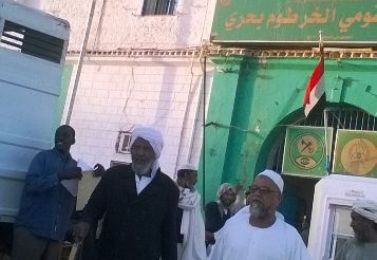Sudanese security releases six ISIS sympathizers
January 28, 2016 (KHARTOUM) – Sudan’s National Intelligence and Security Services (NISS) has released a second batch of the Salafist Jihadist preachers and Islamic State (ISIS) sympathizers Thursday evening, Sudan Tribune has learnt.

Last August, NISS arrested al-Sidairah, Emir-general of the Jama’at al-I’tisam bil-Quran wal-Sunna Abdel-Khalig and its political secretary, al-Obied Ibrahim besides the Imam (prayer leader) and director of Imam Bukhari religious institute, which is suspected to be the main incubator and recruiting place for the students who joined ISIS, Salah al-Din Ibrahim.
Reliable sources told Sudan Tribune that the release of the religious leaders came after they pledged not to disseminate views of the extremist group or recruit college students and young people to travel to Iraq, Syria and Libya to join ISIS.
The Salafist Jihadist emphasised that the released have arrived in their homes in neighborhoods of Al-Hag Youssef in East Nile province and Al-Doroshab in North Khartoum.
Last month, the director of NISS Mohamed Atta said all ISIS recruiting cells in Sudan are in grip of his agency. He pointed that intensive efforts are being made in secret to curtail the spread of the ISIS views and prevent youth groups from joining the extremist organization
The release of this batch indicates that all Salafist Jihadist preachers have been freed following the release of the first batch which inckuded Mohamed Aba Yazid, Abas Adil Abas, Salih Kamal al-Din al-Majzoub and Abd Allah Mubarak.
Also, NISS has recently released the general coordinator of the One Nation Movement group and the openly supporter of ISIS, Mohamed Ali al-Gizouli.
Expert on the Jihadist groups, Al-Hadi Mohamed Al-Amin, told Sudan Tribune that it was for the first time the NISS arrests leaders of the Jama’at al-I’tisam bil-Quran wal-Sunna despite the fact that this group excommunicates the regime and opposes its policies.
On 26 July 2014 Jama’at al-I’tisam bil-Quran wal-Sunna issued a statement signed by its former leader, Sulieman Abu Naro, pledging allegiance to al-Baghdadi and expressing support for the declaration of the Islamic Caliphate.
Also, the group, under its current leader, Abdel-Khalig, expressed its support to the terrorist attack against the offices of the French magazine Charlie Hebdo in Paris, last January in which 12 people were killed and 11 others injured.
It also supported the killing of the Royal Jordanian Air Force pilot, Muaz Kassasbe, who was burned to death by ISIS last February after his plane crashed over Syria.
Al-Amin, however, pointed that al-Sidairah has been detained four time between late 2012 and mid 2015, attributing the arrest of ISIS sympathizers to pressures exerted on the government by the families of the youngsters who travelled secretly to join the extremist organization.
Al-Sidairah is considered one of the famous Jihadist figures in Sudan. He runs a religious school in Shambat suburb in Khartoum North where he teaches Hadith (a collection of traditions containing sayings of the prophet Muhammad).
He had openly pledged allegiance to ISIS’ leader and the self-proclaimed Caliph, Abu Bakr al-Baghdadi, but he denies involvement in sending young people to Iraq and Syria to join the militant group.
Al-Amin pointed that organized recruiting in Khartoum has increased recently indicating existence of networks that carry out recruitment activities according to a well thought out plans to target students particularly from the University of Medical Sciences and Technology (UMST).
“Surely, Sudanese families abroad whose sons hold foreign passports and have disappeared and travelled [secretly to join ISIS] from Khartoum have put pressure on the government,” he added.
He further said that repeated reporting to the police stations on the disappearance of youngsters became a very disturbing phenomenon to the authorities, noting the latter was forced to crackdown on the Salfist Jihadist centers after they discovered links between the disappeared students and the preachers.
ISIS infiltration into Sudan among the youths has become known last March after British media outlets confirmed that nine medical students from Sudanese origins entered Syria via Turkey to work in hospitals under the control of ISIS.
Last October, the ministry of interior in Khartoum announced that about 70 Sudanese both males and females have went on to join the ISIS franchises both in Libya and Syria.
RELIGIOUS SCHOLARS ATTACK ISIS
Meanwhile, the main pro-government clerical authority, Sudan Religious Scholars Committee (RSC) has likened ISIS to the Khawarij and described it as a faulty protest movement.
Khawarij are members of a sect that appeared in the first century of Islam and has manifested throughout the centuries since. It deviated from mainstream Islam and was known for killing Muslims under allegations of takfir (excommunication).
RCS secretary general, Ibrahim al-Karouri, stressed that about 70 Sudanese have joined ISIS, saying the extremist organization was created by the West to destroy Islam and Muslims from within.
Al-Karouri, who spoke in a symposium on ISIS in Khartoum, said the organization suffers from a political weakness which would lead to its inevitable end, describing it as a faulty protest movement that is incapable of building political institutions.
He pointed to the weak intellectual and ideological foundation of ISIS, likening them to the violent Islamic sect of the Khawarij who misinterpreted the religious texts.
Al-Karouri saw the only alternative to ISIS is to develop strong religious institutions in the Islamic countries, calling upon Muslims to adhere to Islamic centrism through which Prophet Mohamed has built the prestigious Islamic civilization.
He said the emergence of the violent groups was a result of the Muslims cultural backwardness, saying absence of strong Islamic military forces led to the emergence of armed organizations and dictatorship regimes.
Al-Karouri added the Muslim world is currently living in the post-colonial era, holding the colonial powers responsible for the emergence of the totalitarian state in the Muslim countries.
(ST)
